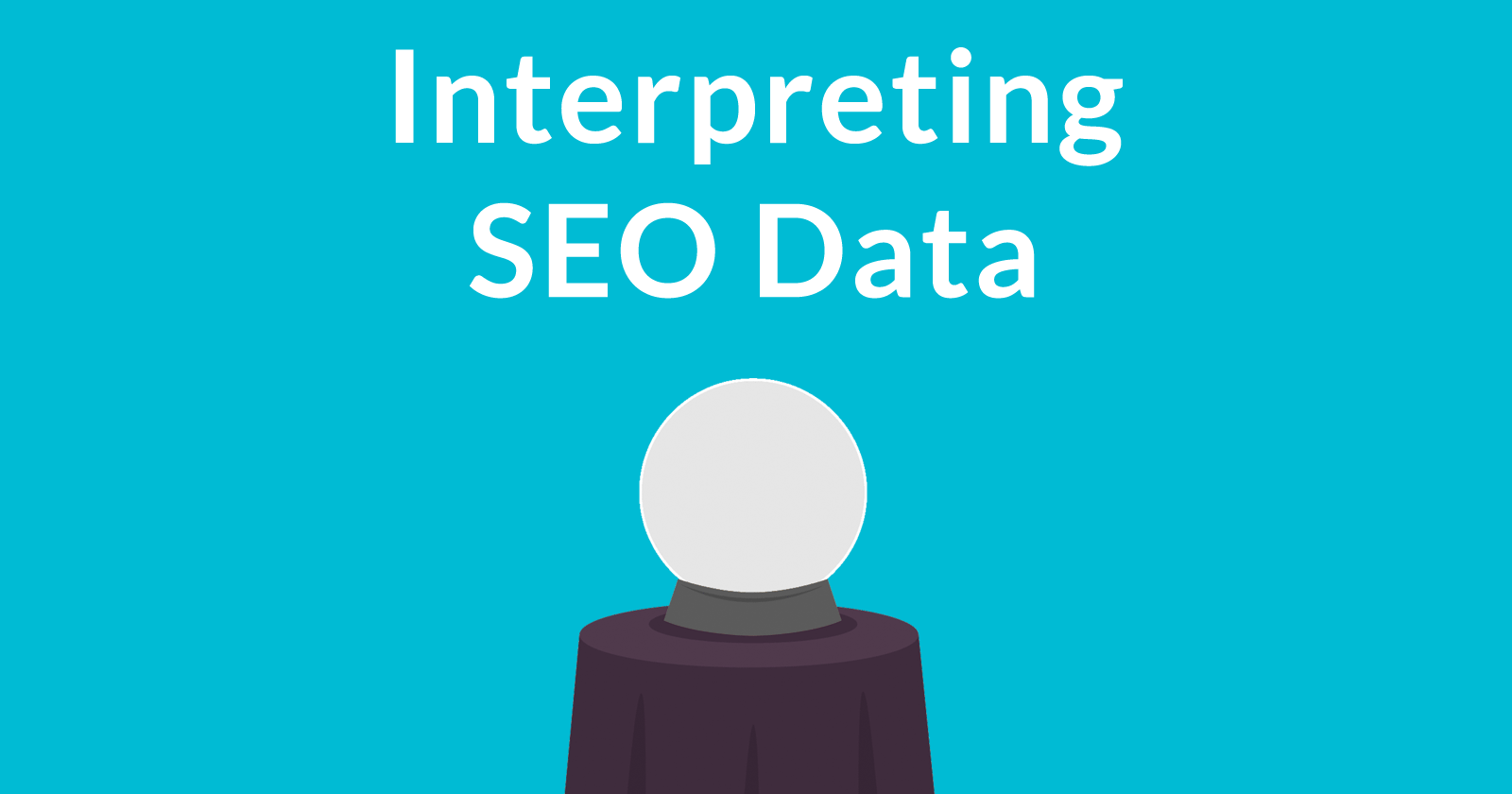In a study of almost a billion web pages, the SEO big data company Ahrefs discovered over 30,000 that had backlinks from over 200 referring domains but still couldn’t obtain organic traffic. Ahrefs reached specific conclusions about these sites based on the data. But I reached different conclusions. Why we came to different conclusions and what this says about interpreting a study of nearly one billion pages.
Value of Examining Outliers
Outliers and oddball results are my favorites for researching. The reasons why sites rank or don’t rank tend to stand in sharper contrast. It’s easier to see the strings that are being pulled.
Ahref’s concluded that for most of these sites, the reason they didn’t receive traffic was because nobody was searching for the keywords associated with those pages.
Ahref’s conclusion is 100% correct. But it misses the nuance of WHY those keywords are not being searched.
Data Does Not Communicate Meaning
The WHY of data is important. Looking at data you can clearly see that nobody is searching for the keywords. Data tells you what happened (no one searches for X keywords) but it doesn’t tell you why.
Why Nobody Searches for Some Keywords
Reviewing the sample of a dozen sites that AHREFS provided, it’s clear that the majority of that sample doesn’t get traffic because their keywords are time sensitive. Those pages are tied to “current” events that are years old. So naturally nobody’s searching for those.
That’s an example of how data does not communicate the meaning of an event. Data only communicates the event itself.
It is up to the skill of the interpreter, the person reviewing the data, to give it meaning.
Data Gains Meaning via Interpretation
Of the rest the sites with many links but no traffic, I discovered that the interpretation of the data was different from how I would interpret it. The data is the same, but the meaning is diffrent.
One of the examples listed in the study stood out as not deficient for the reasons given by the study. This is the URL: https://gumroad.com/l/wordpress-seo
What Did the Ahrefs Study Conclude?
The Ahrefs study concluded that there were two main reasons why the dozen sample sites and the rest of the sites had lots of incoming links but zero organic traffic.
The first reason was that the links were low quality. The second reason was that the pages were not relevant to keywords searchers were searching for.
Here is what the AHREFS study concluded about the above web page:
“By reviewing these (and many other) pages manually, I noticed two general trends that explain why such pages get no traffic despite having so many backlinks:
1. They went overboard with “shady link building” and got penalized by Google;
2. They aren’t targeting a topic that people are searching for in Google.”
Data is Unreliable
The GumRoad.com web page is essentially a squeeze page promoting an SEO ebook. In my opinion, there is little value add to that page. Nobody’s learning anything after reading that page. To be fair, the page is not designed to teach anything. That page is designed to sell.
It’s a reasonable conclusion is that the web page does not obtain traffic, despite having many web links, because the page itself is low quality.
But there is another reason for this.
What Does Google Rank
In order to find out why a page is not ranking, sometimes it’s good to look at what a search engine is ranking. This web page is trying to rank for WordPress SEO. That’s an important keyword phrase.
The keyword phrase, WordPress SEO, is a popular phrase. Many people are searching for those phrases and more as you can see in the screenshot of Google Trends for that keyword phrase.
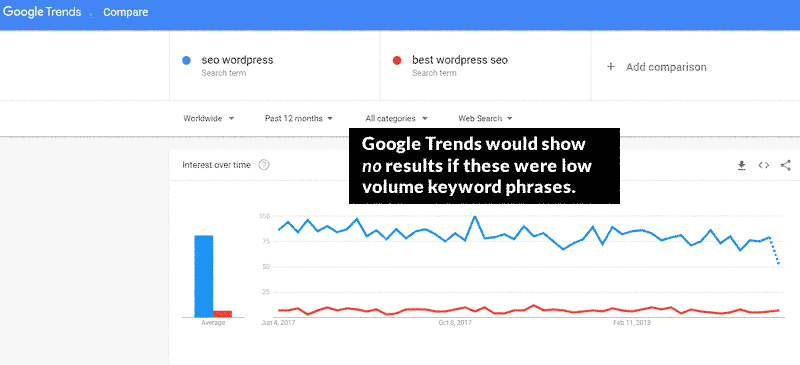
So maybe Ahrefs’ reason for using that as an example is because the inbound links are shady.
I believe that page doesn’t receive much organic traffic. But my reason why it’s not ranking differs from Ahrefs explanation. I will explain why and show you the data to support my conclusion.
That page is trying to rank for competitive keyword phrases and failing. My opinion is that this is happening because the content is not relevant for the keyword phrase.
The likely reason that page is not ranking is because that page is a sales page. The user intent for that keyword phrase (WordPress SEO) is not one that’s going to be satisfied by that web page.
The Fuss About User Intent
Reviewing that web page it is clear to me that the meaning of that page is not WordPress SEO.
The title is:
<title>The Best WordPress SEO Strategy</title>
Additionally, the headings (H1, H2) contain the same keyword phrases:
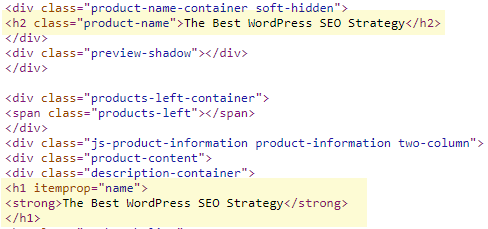
But that’s not what the page is about. Despite that the author insists on that one keyword phrase in the title and headings, the content itself communicates a different meaning, in my opinion.
These are the first words of content in that web page:
“In my 3rd eBook released to date, I’ll be showcasing a WordPress SEO Strategy that I’ve developed for over 7 years.”
The word eBook is repeated 17 times on that page. If Google or Bing were to determine what the user intent associated with that page is about, I believe the user intent wold not be WordPress SEO Strategy.
The phrase WordPress SEO Strategy is associated with the word Plugin. When people search for WordPress SEO, Google Suggest shows us that the user intent associated with that phrase is a WordPress SEO Plugin.
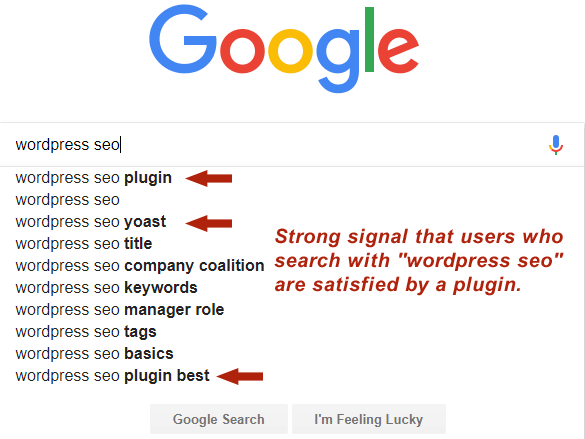
As you can see in the screenshot, Plugin is strongly associated with the phrase WordPress SEO. So it’s no surprise that a plugin site ranks at the top of the page for WordPress SEO Strategy:
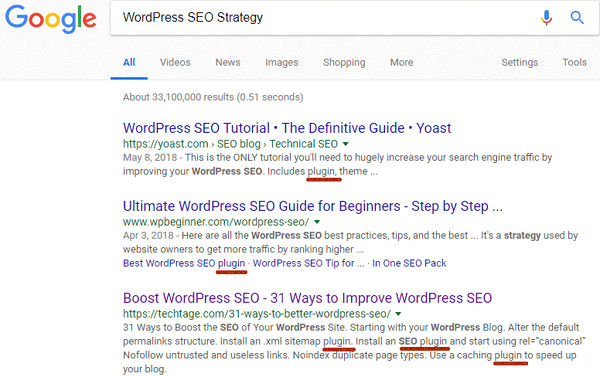
The word “plugin” features strongly in there. In my opinion, the word plugin is a sign of user intent.
If you were trying to evaluate why your site did not rank for the phrase WordPress SEO or WordPress SEO Strategy, focusing on your page quality might not necessarily be helpful. Focusing on the user intent of your content might be more useful for understanding why this ranks and that does not.
Circling back to the GumRoad web page, the word ebook is used 17 times and the word plugin is used nine times. It’s clear that the page is about ebooks. And Google bears this out. That GumRoad web page ranks for the phrase, wordpress seo strategy ebook.
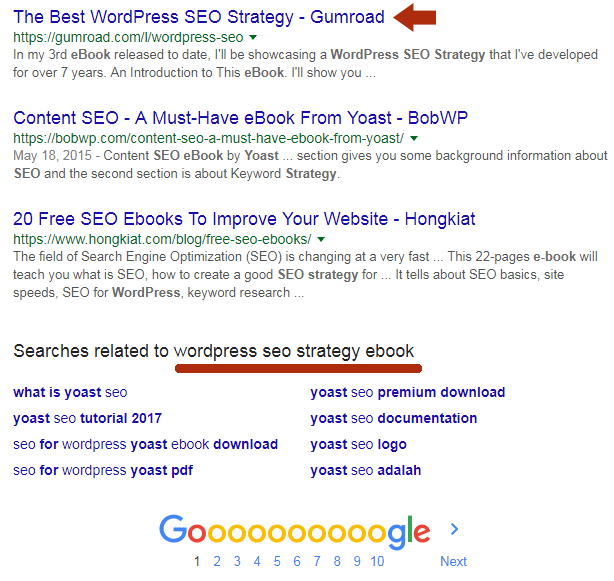
As you can see, that page ranks in position 8 for the phrase wordpress seo strategy ebook. That’s what the user intent of that web page is about. I showed you how that page signaled it with it’s keyword phrases. In my opinion, this is what Googler’s mean when they say that content is the most important signal.
Data is Uncertain
The word Uncertain means that something is not definite. As you can see, data does not tell the whole story. In fact, data is not the story at all. Data is uncertain.
It only becomes something when someone looks at it and gives it meaning. The meaning depends on the person reviewing the data.
So I see an elephant, AHREFS sees a tree trunk, and someone else focusing on the elephant’s trunk perceives a snake. Data is unreliable. AHREFS’ interpretation of the data isn’t necessarily wrong. Mine could be said to be more nuanced.
Read the AHREFS Search Traffic Study here.
Images by Shutterstock, Modified by Author
Screenshots by Author

